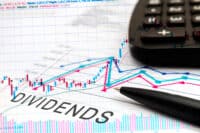 Apple (NASDAQ: AAPL) is often questioned about its hoard of nearly $60 billion in cash and securities. Investors wonder why the most valuable technology corporate in the US based on market capitalization does not use the money for acquisitions or give it back to shareholders as a dividend or at least a share buy-back.
Apple (NASDAQ: AAPL) is often questioned about its hoard of nearly $60 billion in cash and securities. Investors wonder why the most valuable technology corporate in the US based on market capitalization does not use the money for acquisitions or give it back to shareholders as a dividend or at least a share buy-back.
Apple’s decision may be driven in part by the perception that dividend increases and buybacks are an acknowledgment by large public companies that they have run out of uses for their cash. That is, their best periods of growth are behind them and there is no better use for the capital.
Intel (NASDAQ INTC) has just said it will increase its dividend to 18.12 cents a share, 15% higher than it was before. The world’s largest chip company said, “The Intel board is also increasing the authorization limit for share repurchases by an additional $10 billion, which increases the overall outstanding buyback authorization to $14.2 billion.”
Intel released its fourth quarter results last week. Revenue was $11.5 billion, up 3% from the third quarter and 8% higher than the same quarter last year. The results were impressive because the company is so large and year-over-year growth is difficult for huge firms. There is only so much room for improvement.
Apple’s results were much more impressive than Intel’s. Wall St. has noticed the difference. Apple’s shares are up 70% in the last year. Intel’s are only up 7%, which lags the Nasdaq’s improvement of 22%.
The current fourth quarter reporting period for 2010 has been called the “resurrection of the dividend” age. Seventeen large companies have increased pay-outs, according to The Wall Street Journal. These include slow-growing corporations such as CVS/Caremark and Family Dollar Stores.
Many investors would argue that the most important thing companies can do for their futures is to use capital for expansion. That may mean more retail outlets, more R&D, more marketing expenses, or the purchase of other companies for strategic or earnings reasons. Corporations that do not do one or more of these things have lost their vision for the future.
The track record of a relationship between dividend increases/stock buybacks and slow revenue improvement is not definitive, but this quarter it is starting to be.
Douglas A. McIntyre
The #1 Thing to Do Before You Claim Social Security (Sponsor)
Choosing the right (or wrong) time to claim Social Security can dramatically change your retirement. So, before making one of the biggest decisions of your financial life, it’s a smart idea to get an extra set of eyes on your complete financial situation.
A financial advisor can help you decide the right Social Security option for you and your family. Finding a qualified financial advisor doesn’t have to be hard. SmartAsset’s free tool matches you with up to three financial advisors who serve your area, and you can interview your advisor matches at no cost to decide which one is right for you.
Click here to match with up to 3 financial pros who would be excited to help you optimize your Social Security outcomes.
Have questions about retirement or personal finance? Email us at [email protected]!
By emailing your questions to 24/7 Wall St., you agree to have them published anonymously on a673b.bigscoots-temp.com.
By submitting your story, you understand and agree that we may use your story, or versions of it, in all media and platforms, including via third parties.
Thank you for reading! Have some feedback for us?
Contact the 24/7 Wall St. editorial team.



